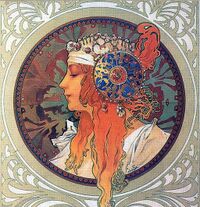Michael I

Byzantine ruler Michael I occupied the hot seat from 811-813, a short reign in a time when the Byzantine Empire was struggling to dogpaddle in a turbulent sea. Its lands were still under the threat of the Abbasid Caliphate in the East. The African coast now included free-lance Arabic raiders and potential invaders. Further West was the Holy Roman Empire of Charlemagne. And just outside the capital, the Bulgarians and their leader Krum were still dining out with utensils made from the body of Michael's late father-in-law.
Michael seemed a bit of a wuss but was probably a decent human being. However, getting the Empire through these happy times was a tall order for any Byzantine emperor, and also too much for Michael to deal with. He never really wanted the job in the first place, but had been propelled by his wife Prokopia to the highest political office.
Early life[edit]
Michael was about 40 when he became emperor. His father Theophylact Rangabe lost his commission as a naval commander for opposing the regency of Irene for her son Constantine VI. Theophylact had his shirt whipped off his back and was banished to a monastery, a mild punishment compared to the fate of others who got on the wrong side of the winning side. Michael survived this reversal of his family's fortunes and stayed in Byzantine political circles.
Somewhere along the way, Michael met Prokopia, the formidable daughter of Nikephorus, Byzantium's official bean-counter (finance minister). It can hardly have been the 'wedding of the year' but the couple got along well enough to produce a healthy family of at least three sons and two daughters. What actual job Michael had at this time isn't recorded. Perhaps he was the Imperial Collector of Beans that Needed Counting.
Rapid social climbing[edit]

The Byzantine Mr Bean was caught up in the palace rebellion that saw empress Irene removed from power in 802. Michael's father-in-law took control as Emperor Nikephoros I. Michael and Prokopia got one of the wings of the imperial palace in Constantinople to inhabit with their family. He appreciated the improvement in his social standing (invitations to all the best parties), but Prokopia remained unhappy. Her younger brother Staurakios became co-emperor and had first dibs on all the best stuff. She called her baby brother (there was a 20-year gap between the two) 'Junior Basileus.' Failing that, she mimed his most annoying habits.
This family feuding didn't distract Nikephoros. He was busy countering the Byzantines' many enemies, mixing diplomacy and metal-bashing where appropriate. Then a Bulgarian called Krum the Krummy turned up with an overactive horde and contrived to kill Nikephoros, critically injure Staurakios, and cost Michael his best silk undergarments.
Going in for the kill[edit]
The bedraggled Byzantine survivors returned to Constantinople in the dead of night to prevent panic. Waiting for them was Prokopia. Michael claimed he had made a half-arsed attempt to put aside his stricken brother-in-law but had been overuled by army generals. This excuse saw Prokopia blow her top. Her brother was a goner (though still breathing) and her husband a purple patsy. Prokopia knew her family had to keep the imperial title or it was curtains for them all; Byzantine politics was brutal to losers and their dependents. The lucky ones ended up in virtual imprisonment inside some damp-walled monastery or dreary nunnery. The less fortunate lost their eyes, tongues and, terminally, their heads.
The farcial 'reign' of Staurakios ended when Prokopia forced her brother to abdicate in favour of Michael. Her sister-in-law, empress Theophano, tried to stop Staurakios from stepping down, but Prokopia got her way. Theophano lost her fancy clothes and was deposited into a monastery. Staurakios just 'died', though observers wondered how he managed to suffocate himself with his own pillow.
Reign[edit]
Once he got on his purple buskins, Michael tackled how to officially treat Charlemagne and his title of Holy Roman Emperor. Like all Byzantines, Michael saw the creation of this new imperial line of supposed emperors as a power grab from the Papacy to pick and choose who should hold the prestigious and preminent title. Nor did they want the Franks to contine expanding their Italian territories like keeping hold of Venice after the two empires had clashed in Nikephoros's reign. Since Charlemagne still wanted to be treated as an equal 'with the Greeks', Michael sent a delegation to Charlemagne's capital at Aachen. Give back Venice and Michael would recognise Charlemagne's imperial title. A few gifts were packed in the diplomatic bags and a set of swishy cloaks were included to impress Charlemagne. The Byzantine envoys greeted him as imperator and basileus, carefully omitting any reference to Rome. 'Charlie' and 'Mickey' were to be BFFs. The Byzantines still laughed behind their hands at the Frankish king and his rank-smelling supporters, but for now, they were a lesser problem than an enemy closer to home. The Bulgarian Krum still had to be defeated. It was then that a military plan was drawn by a group of particular Byzantine amigos. They were a Trinity, Leo the Armenian (later emperor Leo V), Michael the Amorican (later emperor Michael II), and Thomas the Slav (later, nothing, didn't succeed). The plan's aim was to kill Krum. How they might do this was kept secret. Empress Prokopia sent them out with a ticker-tape parade.
By the standards of the day, the army was huge (about 20,000). Emperor Michael was in nominal charge but left the tactics to his generals. They got as far as Adrianople (which wasn't very far at all). There was a dispute about tactics (or maybe hair gel) but it was enough to see Leo the Armenian 'hang back in the rear' alongside his military pals Michael and Thomas. He also suggested it was unwise to pitch camp in a valley. Soon enough, the Bulgarians found Michael's army and, just as in 811, massacred them. For Michael, this was a distinctive déjà vû. He escaped the battlefield, but only got as far as Leo's post. Leo did not let Michael PASS GO nor COLLECT $200. Sensing that he was about to be killed, Michael abdicated. Leo became emperor.
Your eyes or your junk[edit]
In the event, Michael I was allowed to retire to a monastery without suffering loss of limbs or vision, as usually happened to the losers in a rebellion. His wife Prokopia had her official spending cards cut up and she too was ordered to spend the rest of her life as a nun. At least, Michael didn't have to live with her. Their daughters Gorgo and Theophano had been looking forward to marrying into Byzantine nobility. Instead they had their hair cut off and were sent to a convent.
The emperor's sons had something of a mixed fate. Theophylaktos and Niketas had their johnsons removed (the alternative being their eyes) but were allowed to became priests. One of them Niketas (renamed Ignatios) would later become Patriarch of Constantinople twice and a saint once. Ignatios's disputed patriachal status would lead to the Fourth Council of Constantinople (Catholic Church)[1]. He was one of the very few patriarchs not able to grow a beard. A side effect of becoming a eunuch.[2].
The ex-emperor seems to have been happy to stay alive and caused no further trouble to the Byzantine authorities. Prokopia complained bitterly at being forced to take religious vows and being locked away in a convent. She wrote long letters demanding to be freed but her correspondence was ignored.
Post-imperial retirement[edit]
Once he had stepped down, Michael happily stayed in his monastery and steered clear of politics. He was blessed with another 30 years to quietly contemplate his brief career as an emperor.
References[edit]
- ↑ Ignatios had backed the losing side in a struggle between dowager empress Theodora and her brother Bardas over who had authority over Michael III
- ↑ Ignatios beardless mosaic can be seen in the Hagia Sophia.
| Preceded by: Staurakios |
Byzantine Emperor 811-813 |
Succeeded by: Leo V |



